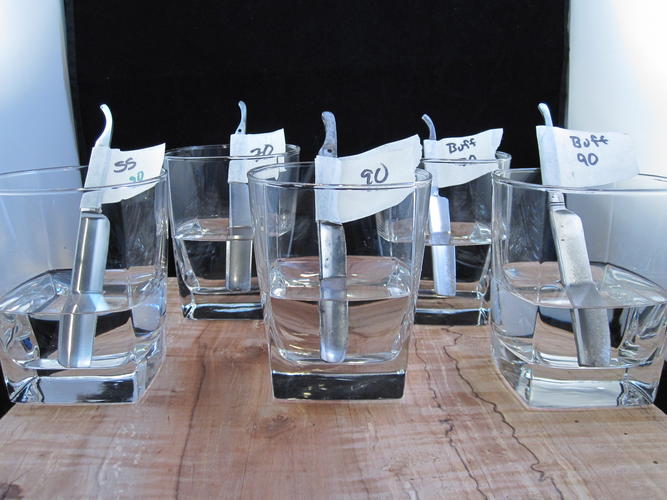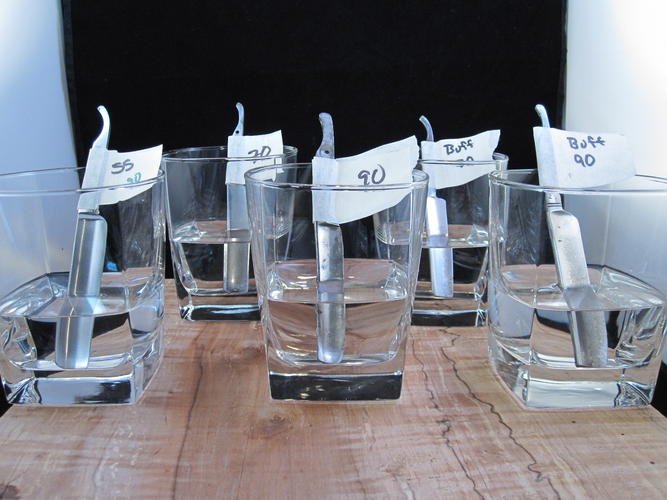Results 31 to 40 of 69
-
06-30-2011, 11:00 PM #31Senior Member

- Join Date
- May 2011
- Location
- Cowra, New South Wales, Australia
- Posts
- 579
Thanked: 46
Over extended time exposed to air two things will happen. Firstly the alcohol will absorb water from the air and very slowly dilute the solution. I do mean VERY slowly. Second the water in the solution will slowly absorb carbon dioxide from the air and become slightly acidic. Leave the whole solution exposed to air long enough and it will turn into a very weak acid solution. How long? Probably days.
-
06-30-2011, 11:41 PM #32At this point in time...




- Join Date
- Jun 2007
- Location
- North Idaho Redoubt
- Posts
- 27,104
- Blog Entries
- 1
Thanked: 13249
LOL you guys crack me up, Way, way to much science involved there,,, In my eyes, I have already decided that anything over 1 hour risks rust, the rest is all just for fun and because I had the razors, the glasses, and the alcohol already set up with the camera...
To be totally honest I will probably never soak a razor just a wipe down and let it dry
In fact the only thing that has surprised me is the SS razor is doing so well...Last edited by gssixgun; 06-30-2011 at 11:44 PM.
-
The Following 4 Users Say Thank You to gssixgun For This Useful Post:
baldy (07-01-2011), Caledonian (07-01-2011), cudarunner (06-30-2011), Voidmonster (07-01-2011)
-
07-01-2011, 12:12 AM #33

"Water is what I would describe as a stable compound in terms of its physical properties. Over a pretty wide temperature range (0-100C) there really isn't a lot going on and it stays almost exclusiviely in the liquid phase. Isopropyl alcohol on the other hand is a lot less stable. Even at temperature in the range of the liquid phase, you have quite a bit of evaporation, as I'm sure you could smell. Both compound contain oxygen, so both will cause the nails to rust (oxidize). But due to increased kinetic energy in the alcohol (what is causing this evaporation to happen), chemical reactions are going to happen at an increased rate. Therefore, the alcohol will increase the rate of oxidation, leading to more rust. "
“Two things are infinite: the universe and human stupidity; and I'm not sure about the universe.”
Albert Einstein
-
07-01-2011, 12:20 AM #34Senior Member

- Join Date
- May 2011
- Location
- Cowra, New South Wales, Australia
- Posts
- 579
Thanked: 46
The oxygen in both compounds is bound and is not the cause of the rust. Dissolved gasses including oxygen gas (ie not from the H2O molecule) as well as the ions from dissolved solids (like salt) are what causes the corrosion attributed to water. Metals corrode slower submerged in "dead" water (ie no dissolved oxygen, like that found in a pond overloaded with algae) than standing in air due to the different amount of available oxygen.
-
07-01-2011, 12:28 AM #35

I'm going to be beat up here!
Didn't anyone take the time to read that GSSIXGUN had said that there was too much 'Science' being interjected and that his 'Simple' Experiment 'Simply' showed that wiping down a razor with simple 'Rubbing Alcohol' wouldn't do it any harm!!!! Oiling afterwards is a Good Thing!!!Our house is as Neil left it- an Aladdins cave of 'stuff'.
Kim X
-
07-01-2011, 12:41 AM #36
-
07-01-2011, 02:57 AM #37At this point in time...




- Join Date
- Jun 2007
- Location
- North Idaho Redoubt
- Posts
- 27,104
- Blog Entries
- 1
Thanked: 13249
I took one at 8 am before work, there is black rust present under the line on 4 razors the SS I still see nothing at all...

I took another at 8 pm tonight, I was out in the shop playing Carpenter and Electrician after work, setting up the newest workbench out in the extention... Kinda nice since all the saws and the sander are out there now
Anyway 4 of the razors are showing rust spots at the edges I haven't touched them or pulled them yet so I don't know the depth or the rust or how bad it really is but I see it... The SS razor is still clean visually...

-
The Following User Says Thank You to gssixgun For This Useful Post:
cudarunner (07-01-2011)
-
07-01-2011, 03:52 AM #38

One might actually draw the opposite conclusion. Based on what Glen said, there is a chance that the splashing of alcohol onto a razor caused rusting. A similar scenario would be wiping a razor down with alcohol and leaving some behind. So the setup supports the idea that wiping a razor down with simple rubbing alcohol could do harm.
Also, I can understand if some people may not like the notion of "doing science," but let's remember that "science" is nothing more than the collective attempts of humans to understand and describe the world around them. As such, this thread is inherently a drive towards science.
-
The Following User Says Thank You to holli4pirating For This Useful Post:
MickRussell (07-01-2011)
-
07-01-2011, 04:49 AM #39Senior Member

- Join Date
- Mar 2007
- Posts
- 608
Thanked: 124
Well, from my limited understanding of these things, I'd be more worried about alcohol b/c it works as a degreaser, not because it is chemically active enough to damage/patina a razor, like acids such as vinegar or naval jelly. When I've blued blades and had them completely degreased they happily rust very quickly. Somewhat in keeping with this experiment, those that have had high grit buffing can rust within an hour.
-
07-01-2011, 11:21 AM #40

I don't think we have to look much further than the fact that alcohol exposed to the air is colder than that air, colder than water would be, and the razors become cold with it. So moisture condenses on the part that is exposed to the air. It doesn't much matter whether that water vapour rose from the surface of the liquid, or was naturally present in the atmosphere. It is just what would happen to cold and newly-buffed steel stood in cold water, or in some climates without it. The next stage in the experiment ought to be standing a razor in pure water, and dropping in an ice cube every hour or so.
Incidentally no pure liquid will cause rust. It needs water plus dissolved oxygen. If you have some compelling reason to store a razor in alcohol, just fill the vessel to the top and cap it tightly. I believe the same would apply with freshly boiled water. Hot water dissolves more of a solid, but cold water dissolves more of a gas.
Kinetic energy is the energy which an object has by virtue of its motion, examples being a bullet or a brick you drop on your toe. If the alcohol has kinetic energy, i wouldn't stand in its way. There are quotation marks in the thread that mentioned it, and it would be useful to know the source being quoted, so that we can avoid it.
I think the most important information to be gleaned from this experiment is that the "rust" produced was mostly the relatively harmless black oxide, and extremely shallow. In no way did it confirm the results seen in the previous thread. I still think the presence of another metal in a conducting liquid is the most likely explanation for what happened there.


 54Likes
54Likes LinkBack URL
LinkBack URL About LinkBacks
About LinkBacks






 Reply With Quote
Reply With Quote





